- Home
- Margaret Atwood
Bluebeard's Egg Page 4
Bluebeard's Egg Read online
Page 4
After I had been going out with Buddy for a month or so, my brother decided it would be in my own best interests to learn Greek. By that he meant he would teach it to me whether I liked it or not. In the past he had taught me many things, some of which I had wanted to know: how to read, how to shoot with a bow, how to skip flat rocks, how to swim, how to play chess, how to aim a rifle, how to paddle a canoe and scale and gut a fish. I hadn't learned many of them very well, except the reading. He had also taught me how to swear, sneak out of bedroom windows at night, make horrible smells with chemicals, and burp at will. His manner, whatever the subject, was always benignly but somewhat distantly pedagogical, as if I were a whole classroom by myself.
The Greek was something he himself was learning; he was two grades ahead of me and was at a different high school, one that was only for boys. He started me with the alphabet. As usual, I didn't learn fast enough for him, so he began leaving notes about the house, with Greek letters substituted for the letters of the English words. I would find one in the bathtub when I was about to take a bath before going out with Buddy, set it aside for later, turn on the tap and find myself drenched by the shower. (Turn off the shower, the note would read when translated.) Or there would be a message taped to the closed door of my room, which would turn out to be a warning about what would fall on me - a wet towel, a clump of cooked spaghetti - when I opened it. Or one on my dresser would announce a Frenched bed or inform me that my alarm clock was set to go off at 3 A.M. I didn't ever learn much real Greek, but I did learn to transpose quickly. It was by such ruses, perhaps, that my brother was seeking to head me off, delay my departure from the world he still inhabited, a world in which hydrogen sulphide and chess gambits were still more interesting than sex, and Buddy, and the Buddies to come, were still safely and merely ridiculous.
My brother and Buddy existed on different layers altogether. My brother, for instance, was neither cute nor a pill. Instead he had the preternatural good looks associated with English schoolboys, the kind who turned out to be pyromaniacs in films of the sixties, or with posters of soldiers painted at the time of World War One; he looked as if he ought to have green skin and slightly pointed ears, as if his name should have been Nemo, or something like it; as if he could see through you. All of these things I thought later; at the time he was just my brother, and I didn't have any ideas about how he looked. He had a maroon sweater with holes in the elbows, which my mother kept trying to replace or throw out, but she was never successful. He took her lack of interest in clothes one step further.
Whenever I started to talk like what he thought of as a teenager, whenever I mentioned sock hops or the hit parade, or anything remotely similar, my brother would quote passages out of the blackhead-remover ads in his old comic books, the ones he'd collected when he was ten or eleven: "Mary never knew why she was not POPULAR, until.... Someone should tell her! Mary, NOW there's something you can do about those UGLY BLACKHEADS! Later.... Mary, I'd like to ask you to the dance. (Thinks: Now that Mary's got rid of those UGLY BLACKHEADS, she's the most POPULAR girl in the class.)" I knew that if I ever became the most popular girl in the class, which was not likely, I would get no points at all from my brother.
When I told Buddy I would be away for the summer, he thought I was "going to the cottage," which was what a lot of people in Toronto did; those who had cottages, that is. What he had in mind was something like Lake Simcoe, where you could ride around in fast motorboats and maybe go water-skiing, and where there would be a drive-in. He thought there would be other boys around; he said I would go out with them and forget all about him, but he said it as a joke.
I was vague about where I was actually going. Buddy and I hadn't talked about our families much; it wouldn't be easy to explain to him my parents' preferences for solitude and outhouses and other odd things. When he said he would come up and visit me, I told him it was too far away, too difficult to find. But I couldn't refuse to give him the address, and his letters arrived faithfully every week, smeared and blobby, the handwriting round and laborious and child-like. Buddy pressed so hard the pen sometimes went through, and if I closed my eyes and ran my fingers over the paper I could feel the letters engraved on the page like braille.
I answered Buddy's first letter sitting at the uneven table with its cracked geological surface. The air was damp and warm; the pad of lined paper I was writing on was sticking to the tacky varnish. My mother was doing the dishes, in the enamel dishpan, by the light of one of the oil lamps. Usually I helped her, but ever since Buddy had appeared on the scene she'd been letting me off more frequently, as if she felt I needed the energy for other things. I had the second oil lamp, turned up as high as it would go without smoking. From behind the green parachute curtain I could hear the light breathing of my sister.
Dear Buddy, I wrote, and stopped. Writing his name embarrassed me. When you saw it on a blank sheet of paper like that, it seemed a strange thing to call someone. Buddy's name bore no relation to what I could really remember of him, which was mostly the smell of his freshly washed T-shirts, mixed with the smell of cigarette smoke and Old Spice aftershave. Buddy. As a word, it reminded me of pudding. I could feel under my hand the little roll of fat at the back of his neck, hardly noticeable now, but it would get larger, later, when he was not even that much older.
My mother's back was towards me but I felt as if she were watching me anyway; or listening, perhaps, to the absence of sound, because I wasn't writing. I couldn't think of what to say to Buddy. I could describe what I'd been doing, but as soon as I began I saw how hopeless this would be.
In the morning I'd made a village out of sand, down on the one small available sandbar, to amuse my sister. I was good at these villages. Each house had stone windows; the roads were paved with stone also, and trees and flowers grew in the gardens, which were surrounded by hedges of moss. When the villages were finished, my sister would play with them, running her toy cars along the roads and moving the stick people I'd made for her, in effect ruining them, which annoyed me.
When I could get away, I'd waded down the river by myself, to be out of range. There was a seam of clay I already knew about, and I'd gouged a chunk out of it and spent some time making it into beads, leaving them on a stump in the sun to harden. Some of them were in the shape of skulls, and I intended to paint these later and string them into a necklace. I had some notion that they would form part of a costume for Hallowe'en, though at the same time I knew I was already too old for this.
Then I'd walked back along the river bank, climbing over the tangles of fallen trees that blocked the way, scratching my bare legs on the brambles. I'd picked a few flowers, as a peace offering to my mother, who must have known I'd deserted her on purpose. These were now wilting in a jam jar on the dresser: bladder campion, jewel-weed, Queen Anne's Lace. In our family you were supposed to know the names of the things you picked and put in jars.
Nothing I did seemed normal in the light of Buddy; spelled out, my activities looked childish or absurd. What did other girls the age people thought I was do when they weren't with boys? They talked on the telephone, they listened to records; wasn't that it? They went to movies, they washed their hair. But they didn't wash their hair by standing up to their knees in an ice-cold river and pouring water over their heads from an enamel basin. I didn't wish to appear eccentric to Buddy; I wished to disguise myself. This had been easier in the city, where we lived in a more ordinary way: such things as my parents' refusal to buy a television set and sit in front of it eating their dinners off fold-up trays, and their failure to acquire an indoor clothes dryer, were minor digressions that took place behind the scenes.
In the end I wrote to Buddy about the weather, and said I missed him and hoped I would see him soon. After studying the blotchy X's and O's, much underlined, which came after Buddy's signature, I imitated them. I sealed this forgery and addressed it, and the next morning I walked out to the main road and put it in our loaf-shaped mailbox, raising the little flag to sh
ow there was a letter.
Buddy arrived unannounced one Sunday morning in August, after we had done the dishes. I don't know how he found out where we lived. He must have asked at the crossroads where there were a few houses, a gas station, and a general store with Coca-Cola ads on the screen door and a post office at the back. The people there would have been able to help Buddy decipher the rural-route number; probably they knew anyway exactly where we were.
My mother was in her shorts, in front of the house, cutting the grass and weeds with a small scythe. I was carrying a pail of water up the slippery and decaying wooden steps from the river. I knew that when I got to the top of the steps my mother would ask me what I wanted for lunch, which would drive me mad with irritation. I never knew what I wanted for lunch, and if I did know there was never any of it. It didn't occur to me then that my mother was even more bored with mealtimes than I was, since she had to do the actual cooking, or that her question might have been a request for help.
Then we heard a noise, a roaring motor noise, exaggerated but muffled too, like a gas lawnmower inside a tin garage. We both stopped dead in our tracks and looked at one another; we had a way of doing that whenever we heard any machine-made sound out on the main road. We believed, I think, that nobody knew we were there. The good part of this was that nobody would come in, but the bad part was that somebody might, thinking our place uninhabited, and the sort of people who would try it would be the sort we would least want to see.
The noise stopped for a few minutes; then it started up again, louder this time. It was coming in, along our road. My mother dropped her scythe and ran into the house. I knew she was going to change out of her shorts. I continued stolidly up the steps, carrying the pail of water. If I'd known it was Buddy I would have brushed my hair and put on lipstick.
When I saw Buddy's car, I was surprised and almost horrified. I felt I had been caught out. What would Buddy think of the decaying cabin, the parachute curtains, the decrepit furniture, the jam jar with its drooping flowers? My first idea was to keep him out of the house, at least. I went to meet the car, which was floundering over the road towards me. I was conscious of the dead leaves and dirt sticking to my wet bare feet.
Buddy got out of the car and looked up at the trees. Charlie and Trish, who were in the back seat, got out too. They gazed around, but after one quick look they gave no indication that they thought this place where I was living was hardly what they had expected; except that they talked too loudly. I knew though that I was on the defensive.
Buddy's car had a big hole in the muffler, which he hadn't had time to fix yet, and Charlie and Trish were full of stories about the annoyed looks people in the back-roads villages had given them as they'd roared through. Buddy was more reserved, almost shy. "You got my letter, eh?" he said, but I hadn't, not the one that announced this visit. That letter arrived several days later, filled with a wistful loneliness it would have been handy to have known about in advance.
Charlie and Trish and Buddy wanted to go on a picnic. It was their idea that we would drive over to Pike Lake, about fifteen miles away, where there was a public beach. They thought we could go swimming. My mother had come out by this time. Now that she had her slacks on she was behaving as if everything was under control. She agreed to this plan; she knew there was nothing for them to do around our place. She didn't seem to mind my going off with Buddy for a whole day, because we would be back before dark.
The three of them stood around the car; my mother tried to make conversation with them while I ran to the cabin to get my swimsuit and a towel. Trish already had her swimsuit on; I'd seen the top of it under her shirt. Maybe there would be no place to change. This was the kind of thing you couldn't ask about without feeling like a fool, so I changed in my cubicle of parachute silk. My suit was left over from last year; it was red, and a little too small.
My mother, who didn't usually give instructions, told Buddy to drive carefully; probably because the noise made his car sound a lot more dangerous than it was. When he started up it was like a rocket taking off, and it was even worse inside. I sat in the front seat beside Buddy. All the windows were rolled down, and when we reached the paved highway Buddy stuck his left elbow out the window. He held the steering wheel with one hand, and with the other he reached across the seat and took hold of my hand. He wanted me to move over so I was next to him and he could put his arm around me, but I was nervous about the driving. He gave me a reproachful look and put his hand back on the wheel.
I had seen road signs pointing to Pike Lake before but I had never actually been there. It turned out to be small and round, with flattish countryside around it. The public beach was crowded, because it was a weekend: teenagers in groups and young couples with children mostly. Some people had portable radios. Trish and I changed behind the car, even though we were only taking off our outer clothes to reveal our bathing suits, which everybody was going to see anyway. While we were doing this, Trish told me that she and Charlie were now secretly engaged. They were going to get married as soon as she was old enough. No one was supposed to know, except Buddy of course, and me. She said her parents would have kittens if they found out. I promised not to tell; at the same time, I felt a cold finger travelling down my spine. When we came out from behind the car, Buddy and Charlie were already standing up to their ankles in the water, the sun reflecting from their white backs.
The beach was dusty and hot, with trash from picnickers left here and there about it: paper plates showing half-moons above the sand, dented paper cups, bottles. Part of a hot-dog weiner floated near where we waded in, pallid, greyish-pink, lost-looking. The lake was shallow and weedy, the water the temperature of cooling soup. The bottom was of sand so fine-grained it was almost mud; I expected leeches in it, and clams, which would probably be dead, because of the warmth. I swam out into it anyway. Trish was screaming because she had walked into some water weeds; then she was splashing Charlie. I felt that I ought to be doing these things too, and that Buddy would note the omission. But instead I floated on my back in the lukewarm water, squinting up at the cloudless sky, which was depthless and hot blue and had things like microbes drifting across it, which I knew were the rods and cones in my eyeballs. I had skipped ahead in the health book; I even knew what a zygote was. In a while Buddy swam out to join me and spurted water at me out of his mouth, grinning.
After that we swam back to the beach and lay down on Trish's over-sized pink beach towel, which had a picture of a mermaid tossing a bubble on it. I felt sticky, as if the water had left a film on me. Trish and Charlie were nowhere to be seen; at last I spotted them, walking hand in hand near the water at the far end of the beach. Buddy wanted me to rub some suntan lotion onto him. He wasn't tanned at all, except for his face and his hands and forearms, and I remembered that he worked all week and didn't have time to lie around in the sun the way I did. The skin of his back was soft and slightly loose over the muscles, like a sweater or a puppy's neck.
When I lay back down beside him, Buddy took hold of my hand, even though it was greasy with the suntan lotion. "How about Charlie, eh?" he said, shaking his head in mock disapproval, as if Charlie had been naughty or stupid. He didn't say Charlie and Trish. He put his arm over me and started to kiss me, right on the beach, in the full sunlight, in front of everyone. I pulled back.
"There's people watching," I said.
"Want me to put the towel over your head?" he said.
I sat up, brushing sand off me and tugging up the front of my bathing suit. I brushed some sand off Buddy too: his stuck worse because of the lotion. My back felt parched and I was dizzy from the heat and brightness. Later, I knew, I would get a headache.
"Where's the lunch?" I said.
"Who's hungry?" he said. "Not for food, anyways." But he didn't seem annoyed. Maybe this was the way I was supposed to behave.
I walked to the car and got out the lunch, which was in a brown paper bag, and we sat on Trish's towel and ate egg-salad sandwiches and drank warm fi
zzy Coke, in silence. When we had finished, I said I wanted to go and sit under a tree. Buddy came with me, bringing the towel. He shook it before we sat down.
"You don't want ants in your pants," he said. He lit a cigarette and smoked half of it, leaning against the tree trunk - an elm, I noticed - and looking at me in an odd way, as if he was making up his mind about something. Then he said, "I want you to have something." His voice was offhand, affable, the way it usually was; his eyes weren't. On the whole he looked frightened. He undid the silver bracelet from his wrist. It had always been there, and I knew what was written on it: Buddy, engraved in flowing script. It was an imitation army I.D. tag; a lot of the boys wore them.
"My identity bracelet," he said.
"Oh," I said as he slid it over my hand, which now, I could tell, smelled of onions. I ran my fingers over Buddy's silver name as if admiring it. I had no thought of refusing it; that would have been impossible, because I would never have been able to explain what was wrong with taking it. Also I felt that Buddy had something on me: that, now he had accidentally seen something about me that was real, he knew too much about my deviations from the norm. I felt I had to correct that somehow. It occurred to me, years later, that many women probably had become engaged and even married this way.
It was years later too that I realized Buddy had used the wrong word: it wasn't an identity bracelet, it was an identification bracelet. The difference escaped me at the time. But maybe it was the right word after all, and what Buddy was handing over to me was his identity, some key part of himself that I was expected to keep for him and watch over.
Another interpretation has since become possible: that Buddy was putting his name on me, like a Reserved sign or an ownership label, or a tattoo on a cow's ear, or a brand. But at the time nobody thought that way. Everyone knew that getting a boy's I.D. bracelet was a privilege, not a degradation, and this is how Trish greeted it when she came back from her walk with Charlie. She spotted the transfer instantly.

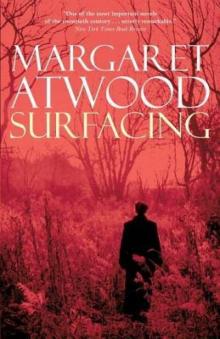 Surfacing
Surfacing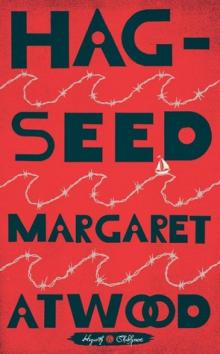 Hag-Seed
Hag-Seed Oryx and Crake
Oryx and Crake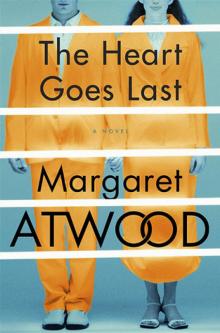 The Heart Goes Last
The Heart Goes Last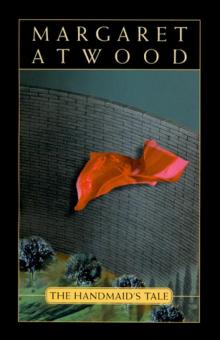 The Handmaid's Tale
The Handmaid's Tale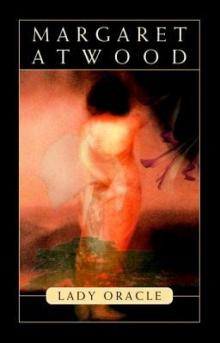 Lady Oracle
Lady Oracle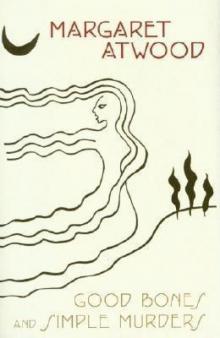 Good Bones and Simple Murders
Good Bones and Simple Murders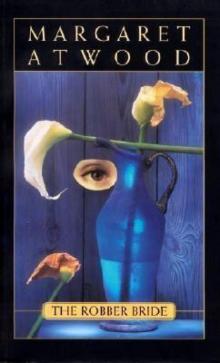 The Robber Bride
The Robber Bride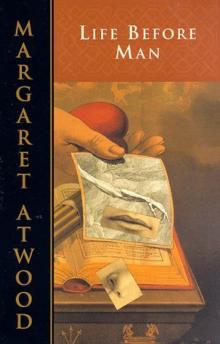 Life Before Man
Life Before Man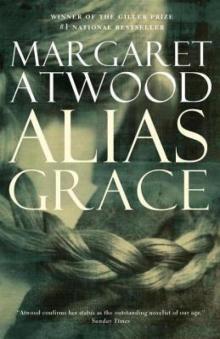 Alias Grace
Alias Grace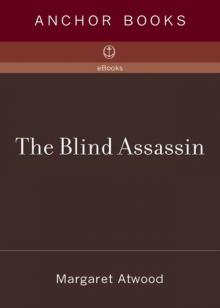 The Blind Assassin
The Blind Assassin Cat's Eye
Cat's Eye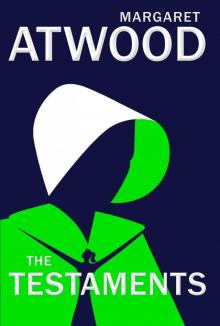 The Testaments
The Testaments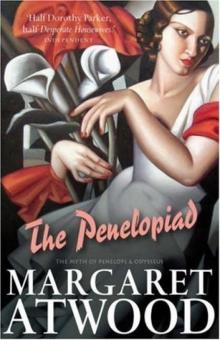 The Penelopiad
The Penelopiad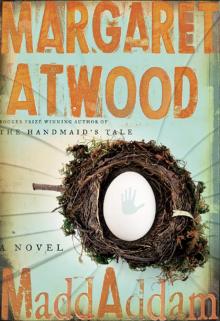 MaddAddam
MaddAddam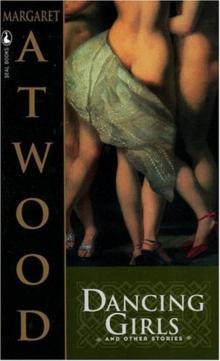 Dancing Girls & Other Stories
Dancing Girls & Other Stories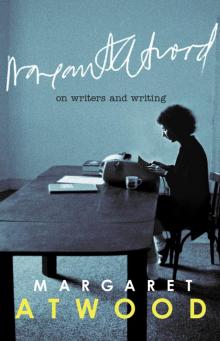 On Writers and Writing
On Writers and Writing Selected Poems II (1976-1986)
Selected Poems II (1976-1986)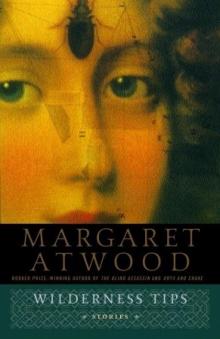 Wilderness Tips
Wilderness Tips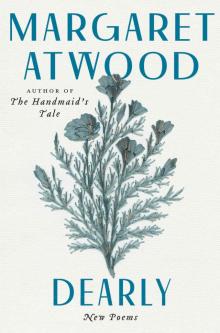 Dearly
Dearly The Tent
The Tent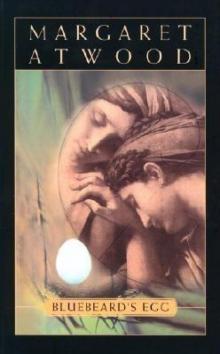 Bluebeard's Egg
Bluebeard's Egg The Edible Woman
The Edible Woman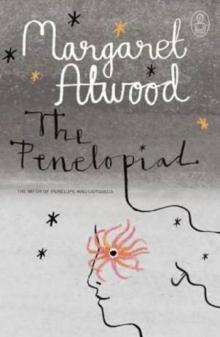 The Penelopiad: The Myth of Penelope and Odysseus
The Penelopiad: The Myth of Penelope and Odysseus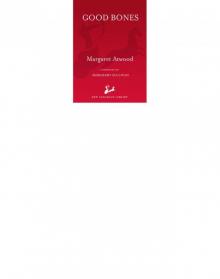 Good Bones
Good Bones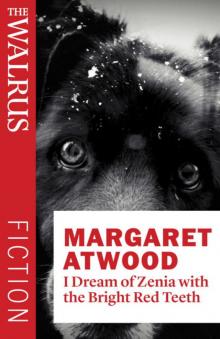 I Dream of Zenia with the Bright Red Teeth
I Dream of Zenia with the Bright Red Teeth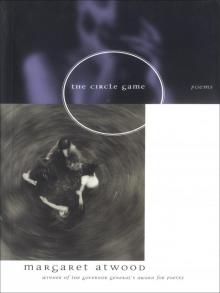 Circle Game
Circle Game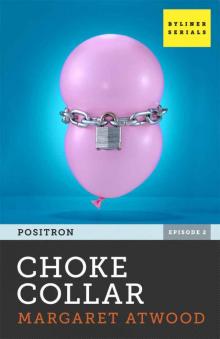 Choke Collar: Positron, Episode Two
Choke Collar: Positron, Episode Two Stone Mattress: Nine Tales
Stone Mattress: Nine Tales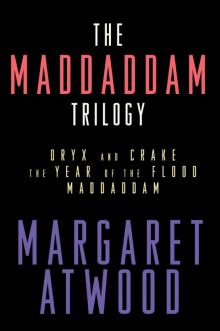 The MaddAddam Trilogy
The MaddAddam Trilogy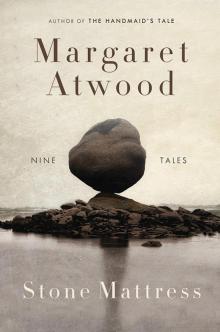 Stone Mattress
Stone Mattress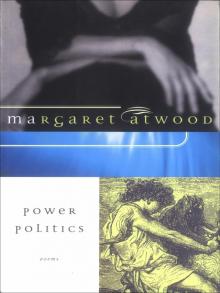 Power Politics
Power Politics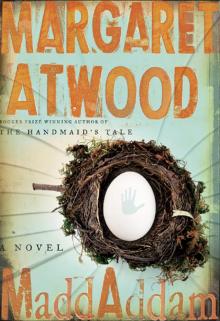 MaddAddam 03 - MaddAddam
MaddAddam 03 - MaddAddam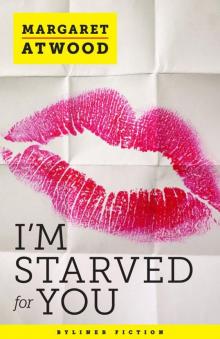 I’m Starved for You (Kindle Single)
I’m Starved for You (Kindle Single) Murder in the Dark
Murder in the Dark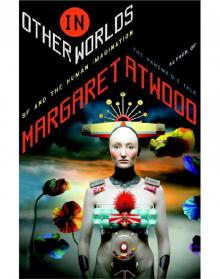 In Other Worlds
In Other Worlds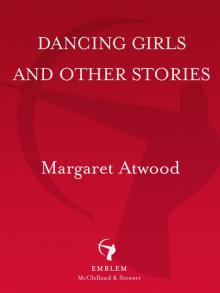 Dancing Girls
Dancing Girls Moral Disorder
Moral Disorder